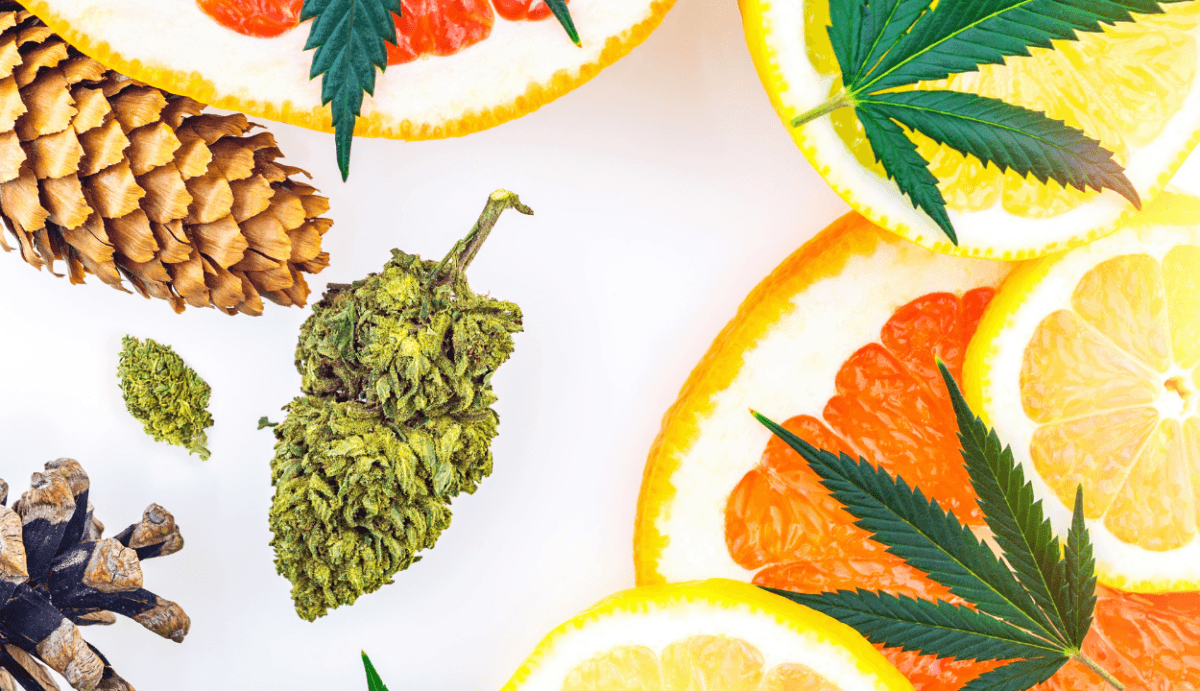Your Cart is Empty
FREE SHIPPING ON ALL ORDERS $75+
If you've shopped our Delta-8-THC vape cart collection (or similar Delta-8 collections on the web) you've probably seen a phrase to the effect of "5% of formula reserved for strain profiling.” But what's that actually mean? What isstrain profiling? And how does it impact your experience as the consumer?
To put it briefly, strain profiling is a method of creating non-flower products that carry the unique therapeutic properties of certain hemp flower strains. It's a method that goes beyond the basic Delta-8-THC cartridge by using terpenes to create targeted therapeutic products. Let's break that down further:
Table of ContentsYou've heard of a cannabis strain, but do you know what makes one cannabis strain different from the next? The answer is it's cannabinoid and terpene profiles. In other words, different strains have different levels of cannabinoids, and most significantly, different levels of different terpenes.
What are terpenes?
Terpenes are the aromatic compounds in cannabis that give it its scent, but they are also known to have potent therapeutic benefits of their own. Terpenes actually exist in all plants and are the reason that some herbal remedies, like essential oils, may provide some targeted therapeutic effects, too.

For instance, limonene is an abundant terpene found in cannabis, particularly in sativa strains of cannabis flower. It's also the primary terpene found in lemons and many citrus fruits, and limonene can be found in many citrus-based essential oils. Soothing lavender oil may contain large amounts of myrcene, a terpene that's found in abundance in relaxing indica strains of cannabis flower.
Each unique terpene combination can provide unique therapeutic benefits, which is why some Delta-8 strains are known to be more useful for managing pain, while some are particularly useful for promoting better sleep.
Choosing the best Delta-8-THC strain has everything to do with these terpenes and the unique therapeutic effects you're after. Of course, terpenes just naturally exist in hemp flower, but they are generally stripped away during the extraction methods used to make Delta-8 concentrates, including Delta-8-THC vaporizers.
So, how do hemp manufacturers create other Delta-8 products that offer the unique therapeutic benefits of different hemp strains? It's simple:
Strain profiling isn't very complex. Manufacturers usually use a simple extraction method similar to the ones used to extract CBD or Delta-8 to remove the terpenes from a specific strain of hemp flower. These terpenes can then be added to a final product to create a concentrate that has an aroma and therapeutic profile similar to the original strain.
Alternatively, a company may purchase terpene concentrates and add a specific amount of different terpenes to a formula in order to replicate a specific strain. In some cases, terpenes can be added to help create targeted therapeutic effects, but the terpene profile may not necessarily be modeled after a specific strain. This isn't technically "strain profiling," but it produces similar effects so it belongs in the same category of products.
A product that is created using strain profiling techniques may be labeled with the name of the original cannabis strain that was mimicked. Alternatively, they could be given new, unique names that explain the aroma or flavor of the product. They may also be labeled in a way that predicts the therapeutic effects you can expect from the strain.

There are no rules as to how profiled products are labeled, and there are no rules that say that a product that is labeled after a specific strain has to contain the same terpenes as that original strain.
In other words, it's important to look past the product's label to determine what's actually in a Delta-8-THC product. Strain profiling offers an opportunity for hemp brands to easily market a product to be something that it's not. For instance, a Delta-8-THC vaporizer could be hyped up with the name "Pineapple Express" on the label, but may not necessarily contain the full and complete terpene profile from the Pineapple Express strain.
If you are overly concerned about the terpene content of a product you intend to purchase, we recommend checking the third-party lab test results to see the actual potency of different cannabinoids and terpenes in the final product.
Other labeling techniques for profiled products are more generalized, so they may offer an option that's a bit easier to navigate for consumers. For instance, our Elev8 Delta-8 vaporizers use a strain profiling technique to create products that provide the general benefits of a sativa, indica, and hybrid strain. They don't necessarily mimic any specific strain, but still provide specific therapeutic effects. You can expect an indica vaporizer to be soothing and relaxing, a sativa vape to spark energy and creativity, and a hybrid to provide a mellow buzz that falls somewhere in the middle.
Thanks to its federal legal status, Delta-8-THC products can be purchased in stores and online from any state where Delta-8 is legal. Buying Delta-8-THC online gives you better access to third-party test results for each product, which means you can verify the strain profile of a Delta-8-THC vaporizer or concentrate more easily.
We recommend checking out our Elev8 Collection, which includes unique sublingual style edibles, tinctures, Delta-8 flower, and three different Delta-8-THC vaporizer strains. Like all Vida Optima products, our Elev8 Collection is third party tested and 100% Farm Bill compliant so you can trust that what you see is what you'll get.

Want to learn more? You may want to read:
Comments will be approved before showing up.



